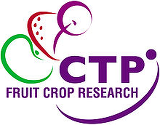RefERENCE: CTP_FCR_2021_2
Supervisors: Dr Lucas Shuttleworth, Prof Xiangming Xu (NIAB EMR), Dr Alexey Mikaberidze (University of Reading)
This student will be registered with the University of Reading. Beginning in October 2021, the successful candidate should have (or expect to have) an Honours Degree (or equivalent) with a minimum of 2.1 in Plant Science, Plant Pathology, Microbiology, or other related science subjects.
Background
Current research indicates that nurseries are key sites for infection of young apple plants by the important fungal pathogen N. ditissima, causing the European apple canker disease. However, the infection is often cryptic, with infected plants showing no symptoms until after they are planted out into the field. What is currently unclear is how physical, environmental, biological and molecular conditions affect the development of the disease from these asymptomatic nursery plants. These parameters include host and pathogen factors, water availability, storage duration and temperature after trees are lifted, variety and the addition of biological or organic amendments (elicitors, plant health stimulators, biocontrol agents).
Objectives and approaches
This PhD project will use a number of lab and field based investigations to help our understanding of the latent infection process of the N. ditissima/apple pathosystem. The research outcomes should enable nurseries and growers to better manage European apple canker. This proposal is closely aligned with an ongoing BBSRC LINK project (apple endophytes in relation to canker development.
The student will focus on conducting lab and field studies to answer the following questions:
- What is driving the latent lifestyle of the fungus? Next-Generation-Sequencing (NGS) (transcriptomics) will be used to investigate gene expression during the latent phase of pathogen infection.
- Are there antagonistic endophytes present at the canker/healthy tissue interface? NGS (metabarcoding) of the endophyte communities and classical diagnostic methods will be used.
- How do factors that stress nursery trees, including cold storage (temperature, moisture/misting, duration), affect canker incidence? This will be investigated using molecular (specific real-time PCR) and classical diagnostic techniques.
- What post-planting factors affect the length of time young trees take to develop canker symptoms?
- Can tree handling techniques and soil amendments with beneficial microbes or other plant elicitors be used to reduce canker development?
Training
The successful candidate will gain a wide range of experience in plant pathology, application of NGS, bioinformatics, apple nursery and orchard management, and statistical data analysis.
Application
Anyone interested should fill the online application form before the deadline of 8th February 2021. If need further help or clarification, please contact recruitmentctp@emr.ac.uk.
Contact Dr Lucas Shuttleworth for an informal discussion on research contents.
